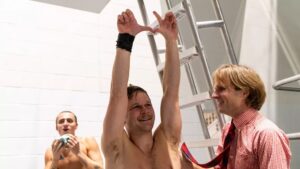
Jesco Helling stood at the edge of the 10-meter platform, preparing for his final dive at the NCAA Big 12 Championships. After slipping to third place earlier in the round, he needed a strong finish. With a high-scoring final dive, Helling secured the University of Utah’s first-ever Big 12 title in diving — making him the first Utah student-athlete to achieve an individual title since moving to the conference.
A graduate student from Germany, Helling is balancing life in the lab with life on the platform. As he works toward a master’s degree in chemical engineering at the U, he also competes on the U’s swim and dive team, managing the demands of elite athletics and academics, often in the same day.
Life as a Student-Athlete
Helling began his master’s degree in chemical engineering in 2024, following an undergraduate career paired with diving at Florida State University. Though he had only one year of NCAA eligibility remaining, he wasn’t ready to hang up his suit.
The demands of being a student-athlete are not lost on Helling. “When you travel, you might have to take a quiz or an exam on the road. I actually had an exam the morning after the Big 12 meet. Those are the silly things you encounter as a student-athlete.”
Even after competitions, Helling wastes no time getting back to his academic responsibilities, often diving straight into studying and exam prep as soon as he returns to the hotel. Balancing both worlds requires serious dedication, but his strong time management skills help him stay on track.
For Helling, excelling in both academics and athletics is a way of securing his future. While he’s passionate about diving, he sees education as essential, recognizing that diving doesn’t offer the same long-term financial opportunities as professional sports like basketball or football.
Science Meets Sport
Although Helling doesn’t directly analyze his diving from an engineering perspective, his scientific background has helped refine his approach to the sport.
He explained that having a strong attention to detail is crucial in diving. Even the slightest adjustment can determine whether a dive is successful or a miss.
Being analytical is a trait that Helling carries both in the classroom and on the diving board. “The attention to detail in diving is similar to engineering in that way,” he said, “But you have to be careful not to overdo it.”
Diving into Water
Helling’s journey at the U has been shaped by both his search for a career and his commitment to sustainability.
“I really wanted a program that would give me the flexibility to transition into the industry, and Utah’s program stood out,” said Helling. “We have core classes like thermodynamics and reaction engineering, but I also love the electives, like renewable energy systems.”
His academic interests extend to water treatment and management, an area he became passionate about during his undergraduate studies. “My capstone project was about a mini water treatment device, and I also worked at a groundwater research institute where I dealt with wastewater treatment,” said Helling.
Helling is currently enrolled in a civil engineering course that centers on water distribution systems. The class is about how drinking water reaches people, from treatment to distribution.
As he moves forward in his academic career, Helling also sees the job market aligning with his interests. “There are a lot of openings in the water resources sector right now, so it’s a great fit.”
After graduation, Helling will join water engineering firm Hansen, Allen & Luce as professional engineering intern, helping to design and optimize municipal water distribution and treatment systems.
Leaving a Legacy
“I am proud to close out my time as a student-athlete and really prepare for life after college,” said Helling. “The master’s program at the U does a great job preparing students for industry right after graduation.”
Helling’s time at the U also marked a transformation in his athletic journey. While he’ll return to Germany to compete in nationals one last time in May, he knows his competitive diving career is nearing its end.
Helling said maintaining a full-time job while competing in diving at the international level isn’t feasible. Staying competitive requires a commitment of around 25 hours each week to training.
But he has no regrets. “Diving has been a huge part of my life, but I’m looking forward to getting my career started,” said Helling.